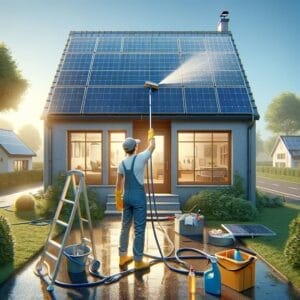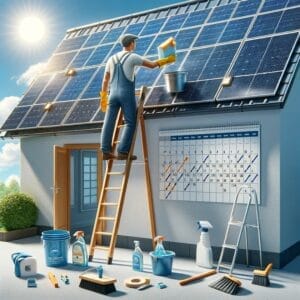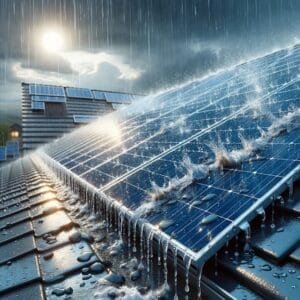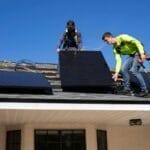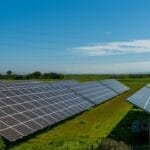Imagine your solar panels as diligent workers, harnessing the sun’s energy every day to power your home. But like any hard worker, they can get a little dusty and grimy, which can really put a damper on their productivity. This is why keeping them clean is not just about looking pretty; it’s about keeping those energy bills low and your home running efficiently. Let’s dive into the best practices for solar panel maintenance and understand just how often you should give them a good scrub.
Key Takeaways
- Regular cleaning maintains solar panel efficiency and energy output.
- Factors like location, pollution levels, and panel angle affect cleaning frequency.
- Use gentle, non-abrasive tools and mild soapy water for cleaning.
- Professional cleaning is recommended for hard-to-reach or large installations.
- Monitor energy output to gauge the best cleaning schedule for your solar panels.
Cleaning for Efficiency: What You Gain
It’s not just about keeping your panels shiny; it’s about what you gain from that shine. Clean solar panels mean they can absorb sunlight without interference from layers of dirt and debris. This directly translates to more efficient energy production and, therefore, more savings on your electricity bill. Think of it like this: when your panels are clean, they can bask in the sun’s rays without anything getting in the way of their sunbathing.
Recognizing the Right Time to Clean
So, when do you roll up your sleeves and get to cleaning? It’s not just about picking a day when you feel like it. You need to keep an eye out for certain signs. If your energy output starts to dip or you can visibly see a layer of dust and grime, it’s time to take action. Besides that, if you live in an area with lots of pollen, bird droppings, or leaves, you might need to clean more often than you think.
Understanding Solar Panel Maintenance
Maintenance is key to longevity and efficiency. It’s not just about a one-time clean; it’s about understanding the needs of your solar panels throughout their life. This involves regular inspections, quick removal of debris, and a gentle cleaning approach to avoid any damage.
The Impact of Dust and Pollution on Your Solar Panels
Let’s get specific about the enemies of your solar panels: dust and pollution. These pesky particles can block sunlight and reduce the amount of energy your panels can produce. It’s like trying to look through a foggy window; you can’t see clearly, and your solar panels can’t “see” the sun clearly either.
Signs Your Solar Panels Need Attention
Keep an eye out for telltale signs that your solar panels are crying out for a clean. This includes visible dirt, bird droppings, or a noticeable drop in energy efficiency. If your once vibrant green energy source starts to look more like a dusty brown, it’s time for some TLC.
Scheduling Cleanings: Seasonal Considerations
When it comes to solar panel cleaning, timing is everything. Seasonal changes bring different challenges for your panels. In the spring, pollen can be a major nuisance, coating your panels with a fine yellow dust. During fall, leaves and other debris can accumulate and block sunlight. And let’s not forget about winter, where snow and ice can render your panels almost useless if not cleared off. So, it’s important to align your cleaning schedule with the seasons and the specific environmental factors they bring.
But remember, safety first. If you’re dealing with snow or ice, be extremely careful. It’s often best to let the sun do the work for you, melting away the wintry blanket. In fact, solar panels are typically installed at an angle, which helps snow to slide off more easily. If you do need to remove snow, use a soft broom or brush to gently sweep it away without scratching the panels.Example: After a particularly dusty summer, you might notice a 10% drop in your solar panel output. This could be a clear indicator that it’s time for a thorough cleaning to restore their efficiency.
After cleaning, keep an eye on the energy output. You should see a noticeable improvement. If not, it may be time to investigate other potential issues with your solar panel system.
Safe and Effective Solar Panel Cleaning Practices
Now, let’s talk about how to clean your solar panels safely and effectively. The key here is to be gentle. Your solar panels are tough enough to withstand the elements but can be damaged by abrasive materials or harsh cleaning chemicals.
Choosing the Right Cleaning Tools
To ensure you’re not doing more harm than good, stick to using a soft brush or a squeegee attached to a long extension pole, and a hose with a suitable nozzle for a gentle spray of water. This setup allows you to clean your panels from the ground, which is safer and often just as effective as climbing up to the roof.
Gentle Methodology: Protecting Your Panels
When cleaning, use lukewarm water and a mild soap if necessary. Avoid high-pressure water sprays, which can damage the panels. Instead, let the soapy water sit for a few minutes to loosen the dirt before rinsing it away with more water. Always clean your panels during the cooler parts of the day—early morning or late afternoon—to avoid rapid temperature changes that could cause the glass to crack.
Most importantly, never step on the solar panels. Not only is it dangerous for you, but it could also break the panels. If you need to reach them, use a sturdy ladder and ensure you’re always within a safe distance to maintain your balance. For more detailed guidance, consider following these best practices on how to clean solar panels.
Do It Yourself or Call the Pros?
While many cleaning tasks can be a fun DIY project, sometimes it’s best to leave things to the professionals—especially when it comes to solar panel cleaning. There are a few things to consider before deciding whether to tackle this job on your own or to dial in the experts.
When to Tackle Solar Cleaning on Your Own
If you have easy access to your solar panels, such as those installed on a ground mount, and if they only require light cleaning, then you might consider doing it yourself. Remember to use the right tools and methods discussed earlier to prevent any damage to your panels or yourself.
Recognizing When to Call in Professional Cleaners
However, if your solar panels are high up or difficult to reach, it’s time to call in the pros. They have the necessary equipment and expertise to clean your panels safely and effectively. Plus, they’re often able to spot and address any potential issues with your system that you might miss.
For instance, a professional cleaner might notice a small crack or a loose connection that could affect your system’s performance. Catching these issues early can save you a lot of trouble down the line.
Another consideration is the size of your solar array. Larger installations can be overwhelming to clean on your own, and this is where the efficiency and thoroughness of a professional cleaning service can be invaluable.
Setting Up a Cleaning Routine That Lasts
Last but not least, let’s talk about setting up a cleaning routine that stands the test of time. It’s not just about the occasional clean; it’s about creating a sustainable, regular practice that keeps your solar panels performing at their best year-round.
Creating a sustainable cleaning schedule involves understanding the specific needs of your solar panel system. This might mean quarterly cleans in dusty areas or perhaps just a couple of times a year in less challenging environments. The key is to be proactive rather than reactive, preventing build-up rather than waiting for it to become a problem.
Monitoring your solar panel output is an excellent way to determine the effectiveness of your cleaning routine. Keep track of the energy production before and after cleaning to gauge the best schedule for your setup. This data-driven approach ensures you’re not cleaning too often or too little, but just right for your home’s unique needs.
Monitoring Solar Panel Output Post-Cleaning
After each cleaning session, it’s crucial to keep an eye on your solar panel output. This is your best indicator of whether the cleaning was successful or if further action is needed. Most modern solar systems come with monitoring software that allows you to track energy production in real-time. If you see a significant increase in output post-cleaning, you’ll know you’ve hit the mark. This immediate feedback loop will help you fine-tune your cleaning schedule to ensure optimal performance throughout the year.
FAQs
Can rain serve as a natural cleaning method for solar panels?
While a good downpour can help rinse away some surface dirt, rainwater alone is not enough to thoroughly clean your solar panels. More often than not, rain will leave behind a residue that can still hinder the efficiency of your panels. Think of it like relying on rain to wash your car; it might remove some dirt, but you’ll still need a proper wash to get it sparkling clean.
Moreover, areas with less frequent rain will naturally require more manual cleaning. It’s also worth noting that rainwater can sometimes contain pollutants that might leave a film on your panels, reducing their effectiveness. So, while rain can assist in the cleaning process, it’s not a substitute for a proper cleaning routine.
For the best results, use rain as a complement to your regular cleaning schedule. After a rainstorm, take the opportunity to give your panels a gentle rinse to remove any lingering residues.
How can I tell if reduced energy output is due to dirty solar panels?
To determine if dirt is the culprit behind reduced energy output, you’ll want to start with a visual inspection. If you see a layer of dust, bird droppings, or leaves, it’s likely that a cleaning will help. Additionally, if you notice a gradual decrease in energy production correlating with an extended dry spell or after a particularly dusty wind, it’s a good indication that your panels could use a wash.
However, if your panels appear clean and you’re still experiencing reduced output, other factors such as shading, equipment issues, or damage to the panels may be at play. In such cases, it’s best to consult with a professional to diagnose and address the problem.
Will cleaning my solar panels myself void the warranty?
Cleaning your solar panels yourself should not void the warranty, provided you follow the manufacturer’s guidelines for maintenance. Most solar panel manufacturers understand that cleaning is a necessary part of maintenance and offer specific instructions on how to do so safely.
It’s important to use non-abrasive cleaning tools and gentle cleaning solutions to avoid scratching or damaging the panels. If you’re ever in doubt, check your warranty documentation or reach out to the manufacturer for clarification before proceeding with a DIY clean.
Is it safe to use soap or detergent when cleaning panels?
Yes, it’s safe to use a mild soap or detergent when cleaning solar panels, but there are a few things to keep in mind. You’ll want to avoid any harsh chemicals that could damage the protective coating on the panels. A gentle, biodegradable soap mixed with water is usually sufficient to get the job done.
Apply the soapy water with a soft sponge or cloth and rinse thoroughly with clean water to prevent any soapy residue from drying on the panels. This residue could potentially interfere with the panels’ ability to absorb sunlight, so it’s crucial to ensure they’re rinsed well.
Are there any automated cleaning systems available for residential solar panels?
Yes, automated cleaning systems for solar panels do exist and can be a convenient option for homeowners. These systems range from simple robotic cleaners that glide across the surface of the panels to more sophisticated setups with integrated water jets and brushes.
While these systems can be quite effective, especially in areas with high dust levels or for large installations, they also come with a higher upfront cost. For the average residential setup, manual cleaning or hiring a professional service periodically may be more cost-effective. However, if you’re interested in an automated solution, it’s worth exploring the options available on the market and consulting with a solar professional to determine the best fit for your needs.
Maintaining your solar panels is crucial to ensure they operate at peak efficiency. Over time, dust, dirt, and other environmental pollutants can accumulate on the panels, which can significantly decrease their performance. To get the most out of your solar investment, it’s important to clean your panels regularly. For guidance on the best practices and determining the optimal frequency for cleaning, consider referencing a comprehensive solar panel efficiency guide.


